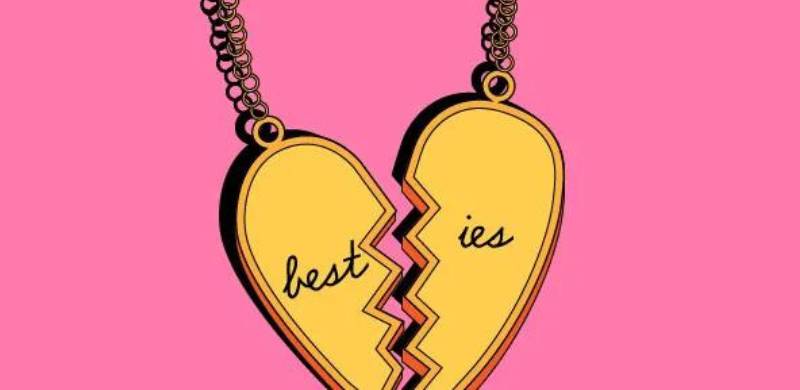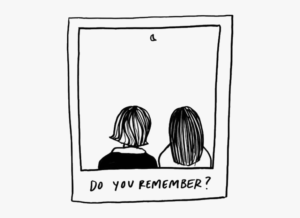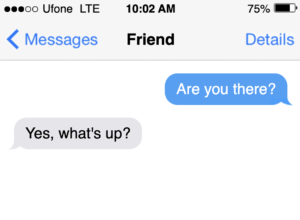
Last night I dreamt about someone I'm no longer friends with. For a while, we were so close, we met almost everyday, and we talked all the time. We made plans to do and see things together: we were both young, had newly moved to New York, and didn't have a single friend in the city, until we found each other. It was a summer full of late night walks and park picnics and sitting by the waterside, laughing till our sides hurt. And then, summer was over. Back to the drudgery of everyday schoolwork we went, and somehow, the bond we had created over the summer slipped through the cracks, never to be seen again. Sometime around New Years, in my final month in the city, I got a lengthy text from addressing the distance that had crept up between us and how it was no longer working for her. I sent my reply back, and that was it. We never spoke again.
And yet, every now and then, I think about her, and I miss her, and I think about what could have been, and why it wasn't. Like I said, last night I dreamt about her, and woke up feeling strange. In the dream, she had a giant golden retriever, and we had made up. In the morning, we were still very much estranged. I haven't reached out to her, even though I have been tempted, at times, and I probably won't either, simply because too much time has passed, and there is too much distance. When I think about what happened between us, I am forced to analyze every single one of my current friendships. Why do the ones that are still thriving work? And what has been common in the ones that failed? My conclusion? Adult friendships are difficult, and require a good deal of commitment and effort for them to work.

When you're in university, all your friendships exist in a bubble being held together by the ecosystem of the university. You go to the same place, and see the same people everyday, and you pick out the ones you would like to keep interacting with. But once you graduate, and everyone gets jobs and moves cities, suddenly, the bubble bursts, and that cohesive force vanishes. Now you have no real reason to stay in touch with the people you've been seeing for the past four years. And what's more, you have other options too. So you get to decide whether to keep that friendship going, or to retire it. Most are retired, and most retirements happen unconsciously. A slow fizzle and then it's gone, like a fizzy tablet dissolving on your tongue, sometimes with the same bitter aftertaste.

I've lived in many cities growing up, and as a result, I've lost many friends too. In the post-social media/instant messaging era, a frequent cause of distress to my ex-friends has been my inability to reply in time; if it happens frequently enough, it's not hard for it to be misread as disinterest. In all the conversations I've had with friends about friendship, it used to strike me as odd that so many people would be bothered by a lack of response. 'You never reach out to me' seemed like a strange thing to say, because it was so easy to argue that the person making the complaint never really reached out either. But these days, I'm less weirded out by that sentiment. We all crave affection and need assurance of it that sometimes can only be given by a prompt reply.

One of my closest friends is someone who I don't talk to everyday, but every few weeks or so, we'll exchange paragraphs and voice notes seeking each other's advice or validation. It's a mode that works for me. I'm unfussy about quick replies because I'm bad at it as well. Which explains how the best working friendships for me, are the ones that feel maintenance and definitely low-pressure. We're all busy, I get it. And if you're someone who always replies to people on time, then it's only fair that you would want friendships that reciprocate that behavior. Perhaps what this means is, I'm not a bad friend after all, just a wrong one, with the wrong people. Maybe that's the secret to adult friendships? Reciprocity?

There's also a departure from the frankly juvenile notion that every friend you make has to fall on a hierarchy and be either your Best Friend Forever, or some denomination of that. How is it fair to delegate that sort of pressure and expectation to someone? Let a friend be a friend please. Be there for them, and let them be there for you, but maybe expecting them to take a bullet for you is a bit much. And not every friend has to be the bullet-taking sort either. Some are just friends to meet occasionally, have a good time, share some food, and then go home. The unnecessary piling of titles and expectations does more harm than good, for both parties, and can be a breeding ground for miscommunication and bitterness.

Adult friendships require you to go out of the way and take out time and effort to maintain them. To be super cliché about it, adult friendships are not unlike a garden that you have to carefully tend to. The plants you water will grow, and those you choose to ignore, will shrivel up and die. If you feel like a friendship is on the verge of death, is it better to perhaps repot that plant and give it to someone else? Which in real life terms means being honest about it and communicating the fading of the friendship, rather than resorting to ghosting and avoidance, as I have done many times in my past? Possibly. It might not save the friendship, but at least it'll save someone from having to figure out what went wrong.
And yet, every now and then, I think about her, and I miss her, and I think about what could have been, and why it wasn't. Like I said, last night I dreamt about her, and woke up feeling strange. In the dream, she had a giant golden retriever, and we had made up. In the morning, we were still very much estranged. I haven't reached out to her, even though I have been tempted, at times, and I probably won't either, simply because too much time has passed, and there is too much distance. When I think about what happened between us, I am forced to analyze every single one of my current friendships. Why do the ones that are still thriving work? And what has been common in the ones that failed? My conclusion? Adult friendships are difficult, and require a good deal of commitment and effort for them to work.

When you're in university, all your friendships exist in a bubble being held together by the ecosystem of the university. You go to the same place, and see the same people everyday, and you pick out the ones you would like to keep interacting with. But once you graduate, and everyone gets jobs and moves cities, suddenly, the bubble bursts, and that cohesive force vanishes. Now you have no real reason to stay in touch with the people you've been seeing for the past four years. And what's more, you have other options too. So you get to decide whether to keep that friendship going, or to retire it. Most are retired, and most retirements happen unconsciously. A slow fizzle and then it's gone, like a fizzy tablet dissolving on your tongue, sometimes with the same bitter aftertaste.

I've lived in many cities growing up, and as a result, I've lost many friends too. In the post-social media/instant messaging era, a frequent cause of distress to my ex-friends has been my inability to reply in time; if it happens frequently enough, it's not hard for it to be misread as disinterest. In all the conversations I've had with friends about friendship, it used to strike me as odd that so many people would be bothered by a lack of response. 'You never reach out to me' seemed like a strange thing to say, because it was so easy to argue that the person making the complaint never really reached out either. But these days, I'm less weirded out by that sentiment. We all crave affection and need assurance of it that sometimes can only be given by a prompt reply.

One of my closest friends is someone who I don't talk to everyday, but every few weeks or so, we'll exchange paragraphs and voice notes seeking each other's advice or validation. It's a mode that works for me. I'm unfussy about quick replies because I'm bad at it as well. Which explains how the best working friendships for me, are the ones that feel maintenance and definitely low-pressure. We're all busy, I get it. And if you're someone who always replies to people on time, then it's only fair that you would want friendships that reciprocate that behavior. Perhaps what this means is, I'm not a bad friend after all, just a wrong one, with the wrong people. Maybe that's the secret to adult friendships? Reciprocity?

There's also a departure from the frankly juvenile notion that every friend you make has to fall on a hierarchy and be either your Best Friend Forever, or some denomination of that. How is it fair to delegate that sort of pressure and expectation to someone? Let a friend be a friend please. Be there for them, and let them be there for you, but maybe expecting them to take a bullet for you is a bit much. And not every friend has to be the bullet-taking sort either. Some are just friends to meet occasionally, have a good time, share some food, and then go home. The unnecessary piling of titles and expectations does more harm than good, for both parties, and can be a breeding ground for miscommunication and bitterness.

Adult friendships require you to go out of the way and take out time and effort to maintain them. To be super cliché about it, adult friendships are not unlike a garden that you have to carefully tend to. The plants you water will grow, and those you choose to ignore, will shrivel up and die. If you feel like a friendship is on the verge of death, is it better to perhaps repot that plant and give it to someone else? Which in real life terms means being honest about it and communicating the fading of the friendship, rather than resorting to ghosting and avoidance, as I have done many times in my past? Possibly. It might not save the friendship, but at least it'll save someone from having to figure out what went wrong.

